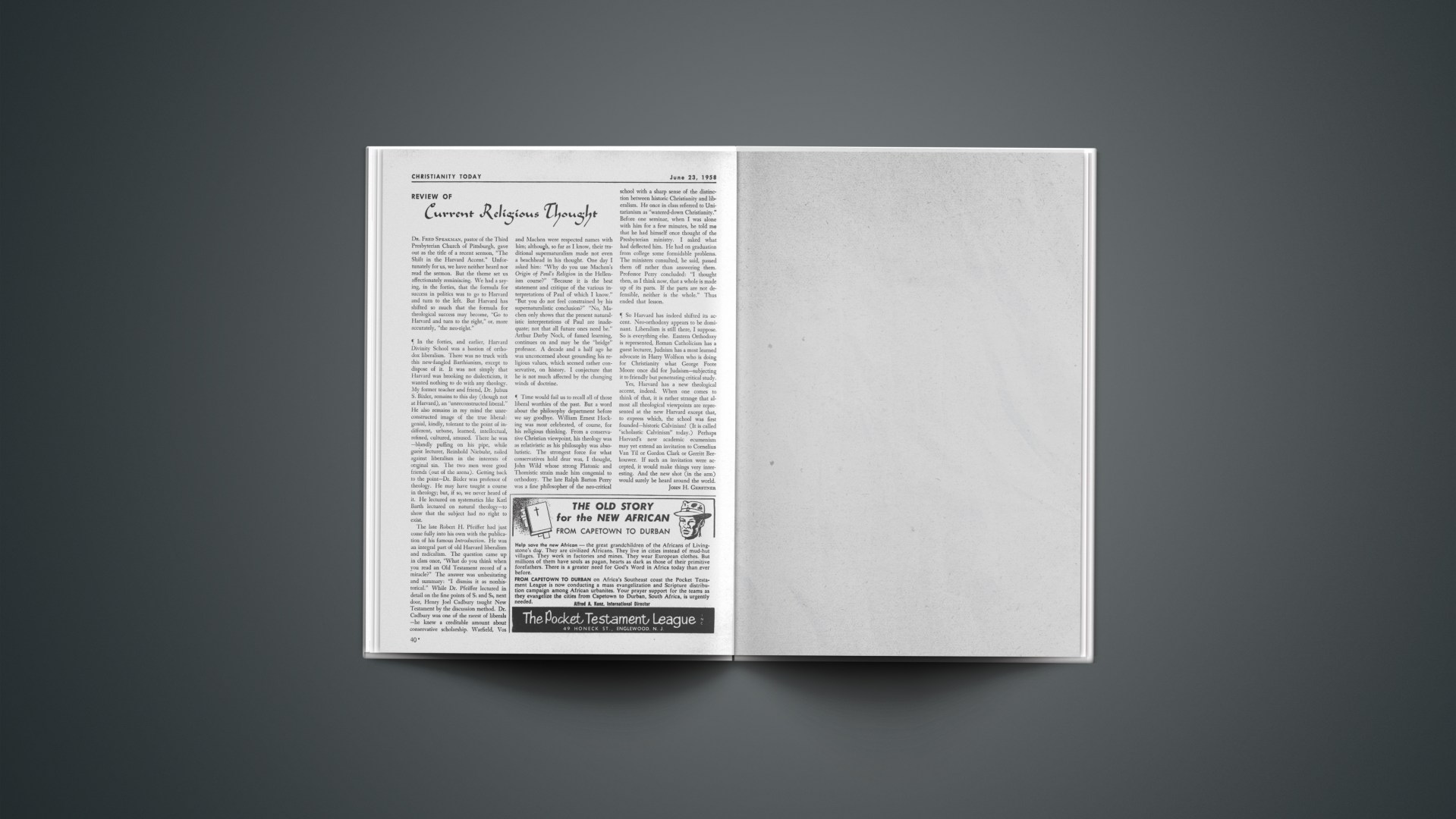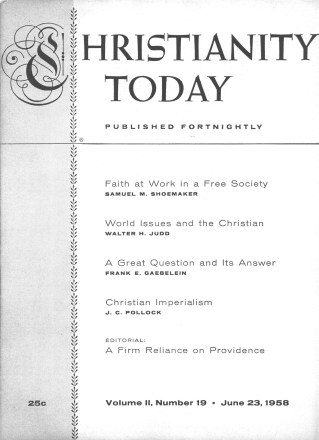Dr. Fred Spearman, pastor of the Third Presbyterian Church of Pittsburgh, gave out as the title of a recent sermon, “The Shift in the Harvard Accent.” Unfortunately for us, we have neither heard nor read the sermon. But the theme set us affectionately reminiscing. We had a saying, in the forties, that the formula for success in politics was to go to Harvard and turn to the left. But Harvard has shifted so much that the formula for theological success may become, “Go to Harvard and turn to the right,” or, more accurately, “the neo-right.”
In the forties, and earlier, Harvard Divinity School was a bastion of orthodox liberalism. There was no truck with this new-fangled Barthianism, except to dispose of it. It was not simply that Harvard was brooking no dialecticism, it wanted nothing to do with any theology. My former teacher and friend, Dr. Julius S. Bixler, remains to this day (though not at Harvard), an “unreconstructed liberal.” He also remains in my mind the unreconstructed image of the true liberal: genial, kindly, tolerant to the point of indifferent, urbane, learned, intellectual, refined, cultured, amused. There he was—blandly puffing on his pipe, while guest lecturer, Reinhold Niebuhr, railed against liberalism in the interests of original sin. The two men were good friends (out of the arena). Getting back to the point—Dr. Bixler was professor of theology. He may have taught a course in theology; but, if so, we never heard of it. He lectured on systematics like Karl Barth lectured on natural theology—to show that the subject had no right to exist.
The late Robert H. Pfeiffer had just come fully into his own with the publication of his famous Introduction. He was an integral part of old Harvard liberalism and radicalism. The question came up in class once, “What do you think when you read an Old Testament record of a miracle?” The answer was unhesitating and summary: “I dismiss it as non-historical.” While Dr. Pfeiffer lectured in detail on the fine points of S1 and S2, next door, Henry Joel Cadbury taught New Testament by the discussion method. Dr. Cadbury was one of the rarest of liberals—he knew a creditable amount about conservative scholarship. Warfield, Vos and Machen were respected names with him; although, so far as I know, their traditional supernaturalism made not even a beachhead in his thought. One day I asked him: “Why do you use Machen’s Origin of Paul’s Religion in the Hellenism course?” “Because it is the best statement and critique of the various interpretations of Paul of which I know.” “But you do not feel constrained by his supernaturalistic conclusion?” “No, Machen only shows that the present naturalistic interpretations of Paul are inadequate; not that all future ones need be.” Arthur Darby Nock, of famed learning, continues on and may be the “bridge” professor. A decade and a half ago he was unconcerned about grounding his religious values, which seemed rather conservative, on history. I conjecture that he is not much affected by the changing winds of doctrine.
Time would fail us to recall all of those liberal worthies of the past. But a word about the philosophy department before we say goodbye. William Ernest Hocking was most celebrated, of course, for his religious thinking. From a conservative Christian viewpoint, his theology was as relativistic as his philosophy was absolutistic. The strongest force for what conservatives hold dear was, I thought, John Wild whose strong Platonic and Thomistic strain made him congenial to orthodoxy. The late Ralph Barton Perry was a fine philosopher of the neo-critical school with a sharp sense of the distinction between historic Christianity and liberalism. He once in class referred to Unitarianism as “watered-down Christianity.” Before one seminar, when I was alone with him for a few minutes, he told me that he had himself once thought of the Presbyterian ministry. I asked what had deflected him. He had on graduation from college some formidable problems. The ministers consulted, he said, passed them off rather than answering them. Professor Perry concluded: “I thought then, as I think now, that a whole is made up of its parts. If the parts are not defensible, neither is the whole.” Thus ended that lesson.
So Harvard has indeed shifted its accent. Neo-orthodoxy appears to be dominant. Liberalism is still there, I suppose. So is everything else. Eastern Orthodoxy is represented, Roman Catholicism has a guest lecturer, Judaism has a most learned advocate in Harry Wolfson who is doing for Christianity what George Foote Moore once did for Judaism—subjecting it to friendly but penetrating critical study.
Yes, Harvard has a new theological accent, indeed. When one comes to think of that, it is rather strange that almost all theological viewpoints are represented at the new Harvard except that, to express which, the school was first founded—historic Calvinism! (It is called “scholastic Calvinism” today.) Perhaps Harvard’s new academic ecumenism may yet extend an invitation to Cornelius Van Til or Gordon Clark or Gerritt Berkouwer. If such an invitation were accepted, it would make things very interesting. And the new shot (in the arm) would surely be heard around the world.










